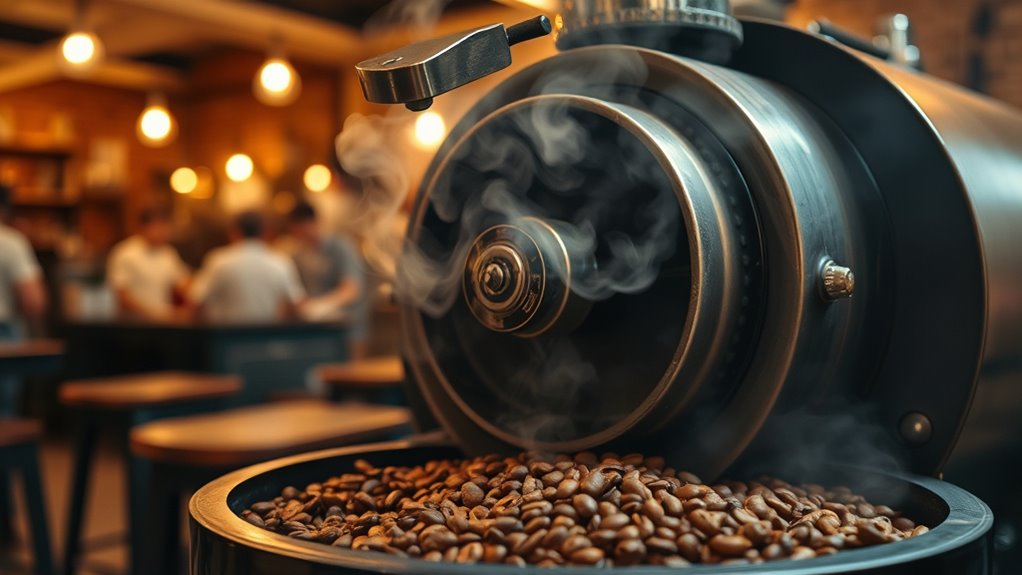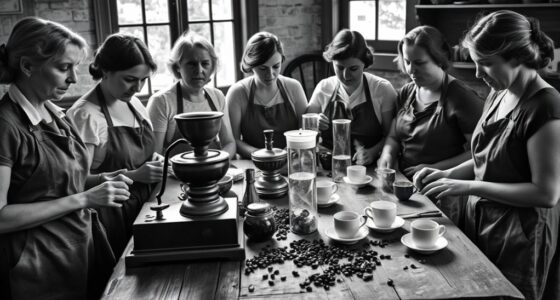Decaffeinated coffee was accidentally discovered when a German merchant, Ludwig Roselius, was working on preserving coffee beans during transport. His experiments unexpectedly reduced caffeine content while keeping the flavor, leading to the creation of decaf. Over time, new techniques have refined decaffeination, improving taste and quality. If you’re curious about how technology continues to shape decaf, there’s more to uncover about its fascinating evolution.
Key Takeaways
- Decaf coffee was accidentally discovered during transport preservation experiments by Ludwig Roselius.
- The process involved unintended caffeine reduction, leading to the development of decaffeination techniques.
- Modern AI and technological advances now optimize decaffeination while preserving flavor.
- The discovery highlights how serendipity played a role in creating a popular coffee alternative.
- Decaf coffee offers health benefits and enjoyment without caffeine-related side effects.

Have you ever wondered if you can enjoy the rich flavor of coffee without the caffeine jitters? Decaf coffee makes that possible, and its journey to your cup is more accidental than intentional. The story begins with a simple mistake during decaf processing, which led to the discovery of a new way to enjoy coffee without the stimulating effects of caffeine. Originally, a German coffee merchant named Ludwig Roselius was trying to find a method to preserve coffee beans during transport, but his experiments inadvertently resulted in a process that considerably reduced caffeine content. This accidental breakthrough paved the way for the development of decaffeination techniques, and over time, these methods became more refined and reliable. Interestingly, modern AI-powered methods are now being explored to further enhance decaffeination processes, ensuring better flavor preservation and efficiency AI-driven decaffeination.
Decaf coffee’s origin was an accidental breakthrough by Ludwig Roselius during transport preservation experiments.
Decaf processing involves several approaches, including solvent-based extraction, water processing, and carbon dioxide methods. Each of these techniques aims to remove caffeine while preserving as much of the original flavor as possible. The decaffeination process is carefully designed to ensure that the beans retain their rich aroma and taste, so you can still enjoy a satisfying cup of coffee without the caffeine punch. Additionally, new technology advancements are helping to improve the precision of caffeine removal, leading to higher quality decaf coffee with minimal flavor loss. Thanks to advancements in decaf processing, the flavor profile of decaffeinated coffee has improved dramatically, making it easier for coffee lovers to switch between regular and decaf options without sacrificing quality.
Beyond taste, many people turn to decaf coffee for its health benefits. Drinking decaffeinated coffee can be a good choice if you’re sensitive to caffeine or need to limit your intake for health reasons. It allows you to enjoy the antioxidants and other compounds found in coffee that have been linked to health benefits, such as reduced inflammation and a lower risk of certain diseases. Additionally, decaf coffee is less likely to cause sleep disturbances or increase anxiety, making it a safer alternative for those with caffeine sensitivities or health conditions that require avoiding stimulants.
In essence, decaf coffee provides a way to indulge in the comforting ritual of your daily brew without the side effects associated with caffeine. The accidental discovery of decaf processing not only revolutionized how coffee is enjoyed but also opened doors for health-conscious drinkers to benefit from coffee’s advantages without the drawbacks. Whether you’re looking to cut back on caffeine or simply prefer the taste of decaf, advancements in decaffeination have made it a viable, flavorful option. So, next time you sip a cup of decaf, remember that its origins are rooted in a serendipitous mistake, leading to a whole new way to enjoy coffee with all the health benefits, minus the jitters.
Frequently Asked Questions
Who First Developed the Decaffeination Process?
You might wonder who first developed decaffeination techniques, and it was Ludwig Roselius in the early 1900s. He experimented with caffeine extraction processes, aiming to remove caffeine from coffee beans without losing flavor. His method involved using solvents to extract caffeine, pioneering the decaffeination process. Today, various techniques like water processing and supercritical CO2 extraction build on his initial work, making decaf coffee widely available.
Are There Different Methods of Decaffeination?
You’ll find there are different methods of decaffeination. Chemical processes, like using solvents or carbon dioxide, remove caffeine efficiently, while natural methods, such as the Swiss Water Process or water processing, use only water and natural filters. Each method impacts flavor differently, so you can choose decaf coffee based on whether you prefer a chemical or natural approach. This variety helps you enjoy decaf without sacrificing taste.
Does Decaf Coffee Contain Any Caffeine at All?
You might wonder if decaf coffee has any caffeine at all, but it usually contains a small amount—about 1-2% of regular coffee caffeine levels. Many decaf flavor profiles still retain the essence of the original brew, despite decaffeination myths suggesting otherwise. So, while it’s not entirely caffeine-free, you can enjoy decaf without the jitters, knowing it’s markedly lower in caffeine and still rich in flavor.
How Has Decaf Coffee Evolved Over the Years?
Over the years, decaf coffee has evolved to better satisfy your preferences for flavor and quality. Today, you’ll find a wide variety of decaffeination methods that preserve the rich coffee flavor you enjoy, aligning with changing consumer preferences. Advances in technology have made decaf more comparable to regular coffee, so you can indulge without the caffeine, enjoying a smoother, fuller taste that meets your lifestyle needs.
Is Decaf Coffee Healthier Than Regular Coffee?
Imagine your morning brew as a gentle lullaby for your senses. Decaf coffee offers fewer caffeine content and some health benefits, like reducing anxiety and improving sleep. While it’s not necessarily healthier overall, it’s a soothing alternative if you’re sensitive to caffeine or seeking to cut back. You get to enjoy the rich flavor without the jitters, making your coffee experience more calming and mindful of your health.
Conclusion
Now, you know the surprising origins of decaf coffee—born from a mistake, yet offering a calming alternative. What once was an accident turned into a daily ritual for millions. It’s ironic how a simple slip-up led to a beverage that promises energy without the jitters. So, next time you sip your decaf, remember: sometimes, the best discoveries come from unexpected errors, blending chaos and calm in every cup.









